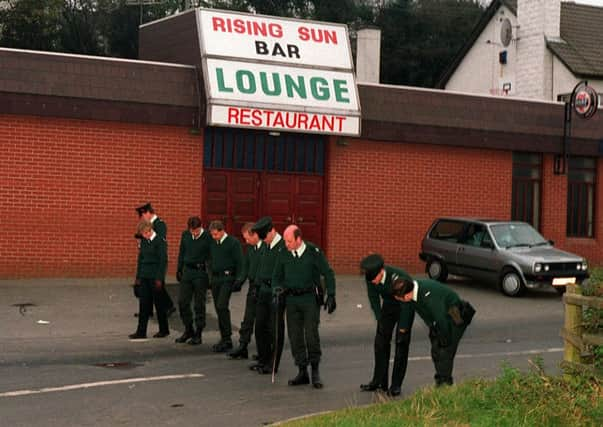Greysteel: Twenty years of quiet dignity


According to Father Stephen Kearney, a Catholic priest in the parish of Faughanvale at the time of the killings, there is a lesson to be learned from the way the families coped and adapted in the aftermath of the loathsome slaughter of innocents at the hands of loyalist gunmen in the Rising Sun bar on October 30, 1993..
Father Kearney praised the way the community of Greysteel showed their “remarkable strength of character” after the killings and for their refusal to be “defined in terms of their victimhood.”
Advertisement
Hide AdAdvertisement
Hide AdHe said: “The families coped. I was on close terms with a lot of them. That (the shooting) is very much a thing of the past.
“The families adapted in a remarkable way to the loss of members of their family. They got on with life. They soon realised that they couldn’t live only knowing themselves as victims of an atrocity and for other people to know them as victims.
“I suppose they moved on and adapted very quickly. Their neighbours would have been Protestants and Catholics.
“They had been neighbours before and they would have treated one another as such. They continued to do that afterwards.
Advertisement
Hide AdAdvertisement
Hide Ad“It might sound cruel to say it but the people of Greysteel made a very good job of living, not only with the loss, grief and pain, but also of their lives as people who would not be defined by their suffering.
“That is not to say that they did not suffer - they suffered as much as anyone - but they carried their pain with them in a quiet, dignified way. They weren’t expecting other people to feel their suffering for them.
“In that way, they showed a remarkable strength of character and I’m certain that if everyone who speaks about being a victim displayed the same greatness of strength as the people of Greysteel then it would be for the better.
“There was a certain amount of a bond between the people it happened to, but partly because of that greatness of strength they soon discovered that they needed to get on with their lives. They needed to eat, they needed to sleep, they needed to laugh.
Advertisement
Hide AdAdvertisement
Hide Ad“It was a deeply profound thing - here were people who lived through something so terrible they could have never imagined.
“Nobody else could live it for them.
“I know some of them - some of them had stayed in touch with me for some time - they and their families suffered horribly. Even with the people that were injured.”
Father Kearney spoke about a woman upon whom gruesome injuries were inflicted by the killers, and whose husband had been killed. He said: “She knew herself that she had gained a degree of respect from people as someone who had suffered greatly, but she did not behave differently or ask to be known for her suffering.”
He continued: “I think that it wasn’t that they were trying to cover up and hide their pain but I do think that if people had followed their example in the way they coped and adapted we might have fewer peace walls.
“There is a lesson to be learned.
Advertisement
Hide AdAdvertisement
Hide Ad“I remember shortly after Greysteel there was a programme on the television - I can’t remember whether it was UTV or whatever else. I was part of a sort of a panel with the audience.
“I remember being asked ‘what is going to happen after this?’
“My reply was ‘come back in a year’s time and you will see people simply getting on with their lives.’”
Those killed that night were: John Burns, Moira Duddy, Joe McDermott, James Moore, John Moyne, Stephen Mullan and Karen Thompson. Victor Montgomery died of his injuries at a later date.